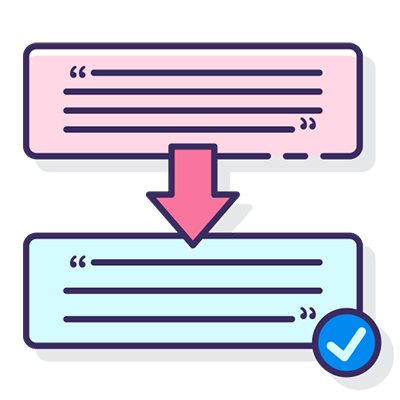
Sentence Construction
Have something to say, and say it as clearly as you can. That is the only secret of style.
– Matthew Arnold
Now that we have a fundamental grasp of how to make more efficient use of words in business writing, it is time to turn our attention to sentences. In this section, we will go over the many components of a sentence, as well as its correct punctuation and the four different types of sentences.

Parts of a Sentence
A complete sentence has two parts: a subject and a predicate.
The subject is what the sentence is about. It is usually a noun or pronoun. The predicate tells something about the subject. It is often indicated by an action verb or a linking verb.
Example:
“The committee recommends a full inquiry over this matter.”
The subject is ‘The committee’ and the predicate is ‘recommends a full inquiry over this matter.’
Subjects and predicates can be simple and complex, so length does not determine what a subject and a predicate are.
Complete sentences are advisable in business writing. Aside from subscribing to the more formal format typical in most business documents, complete sentences are what make sense.
Punctuation
Punctuations are standard marks in writing used to separate words, clauses, and sentences. The use of punctuations can affect a text’s readability, flow, and even meaning.
Commonly used punctuations include:
Period (.) – used to end a sentence, indicating a full stop. Periods are also used after initials and abbreviations.
Question Mark (?) – used after a question.
Exclamation Point (!) – used after statements expressed with strong emotion.
Comma (,) – used to separate items in a series. Also used before and, but, or, nor, for, so, and yet, when they join independent clauses (unless the clauses are short). It is also used to separate items that interrupt a series.
Colon (:) – used to mean “note what follows,” and is typically succeeded by an elaboration, summation, or interpretation of what it precedes.
Apostrophe (‘) – used to show belonging or to indicate the omission of letters in a word.
Semicolon (;) - used to link independent clauses not joined by a coordinating conjunction. As a rule, use a semicolon to end complete sentences in cases where you’re not indicating a full stop.
Brief check
Try to limit yourself to one idea per sentence.
Break down longer sentences into simpler, shorter sentences.
Types of Sentences
Four Kinds of Sentences:
- Declarative: The most commonly used sentence type in business writing, these are sentences that make a statement. They end with a period.
Example: We are writing to inform you that your account would be expiring in ten days.
- Interrogative: These are sentences that ask a question. They end in a question mark. Interrogative questions don’t necessarily follow the format of subject + predicate.

Example: Would you be format renewing your account this year?
- Imperative: These are sentences that give a command or make a request. They usually end with a period, though sometimes they can end with an exclamation point (although to do so is not recommended in business writing).
Imperative sentences are advisable when you’re making a ‘to-do’ list, creating an agenda, or outlining an instructional manual.
Example: Please inform Joseph that we would be expecting his payment on Monday.
- Exclamatory: These are sentences that express strong feelings. They usually end with an exclamation mark.
Example: Congratulations for getting promoted to Vice-President!
Keep your sentences short
In business writing, the fewer words, the better.
The following examples illustrate how to remove unnecessary words that do not add meaning to a sentence.
| Long | Short |
| One of the best things you can do for yourself to improve your writing is to learn how to cut words that are not necessary. 25 words |
To improve your writing, cut out unnecessary words. 8 words |
| Make your employees sufficiently aware of the potentially adverse consequences involved regarding these chemicals. 14 words |
Warn your employees about these chemicals. 6 words |
| In view of the fact that the motor failed twice during the time that we tested it, we are at this point in time looking for other options. 28 words |
Since the motor failed twice during testing, we are now looking at other options. 14 words |
| To be sure of obtaining optimal results, it is essential that you give your employees the resources that are necessary for completion of the job. 25 words |
To get the best results, give your employees the resources they need to complete the job. 16 words |
| Our intention is to implement the verification of the reliability of the system in the near future. 17 words |
We want to verify the system’s reliability soon. 8 words |
| Let me know as to whether or not we can start drilling in view of the fact that the problem has not been fixed at the present time. 28 words |
Since the problem has not yet been fixed, let me know whether we can start drilling. 16 words |
| We hereby advise you, as per your request, that we will be forwarding a copy of the contract to you in due course. 23 words |
A copy of the contract will be sent to you in a few days as requested. 16 words |
| In this e-mail we have attempted to answer all of your questions and we hope that if you have any additional questions whatsoever, please do not hesitate to contact us immediately. 31 words |
If you have any additional questions, please call us. 9 words |
Brief check
Write with a positive attitude by paying attention to the words and expressions you choose to get the results you want.
Sentences should be positive unless there is a reason to stress the “not,” “no” or “never.”
Use positive language
When writing for business, it is essential to employ optimistic language in order to increase the likelihood of achieving the outcomes you seek.
As can be seen in the examples that are provided below, the column on the right transforms negative words into positive ones in order to obtain a favorable response from the reader.
| Negative | Positive |
| We are unable to promote you to supervisor because you do not have the skills and experience required for this position. | We will be able to promote you to supervisor when you meet the experience required for this position. |
| We will not start repairing your test equipment until we receive a deposit. | We will begin repairing your test equipment once we receive a deposit. |
| This is the second time that you do not bother to follow and stick to the duty roster. | This is to remind you again that your attendance is required. |
| If you fail to provide the specifications by the May 1 deadline, the project will fail. | By providing the specifications by May 1, you can be assured that the project will be on time. |
| You cannot reconnect without logging on again. | Log on again to reconnect. |
Practical Application
Carter was attempting to compose a letter to a coworker in which he would convey his appreciation for a job well done, but he was having trouble expressing himself in words. He was aware of the points he wanted to make, but the way he structured his words was not clear. In order to understand what the issue was, he made the decision to simplify his words and break them down into their component pieces. When he did that, he discovered that by adding punctuation, he could make them more fascinating and flow together more smoothly. It is even possible that his statements will influence the reader to change the tone of their own voice as they read them! Now he has a first-rate letter that his coworker won’t be able to help but admire!





